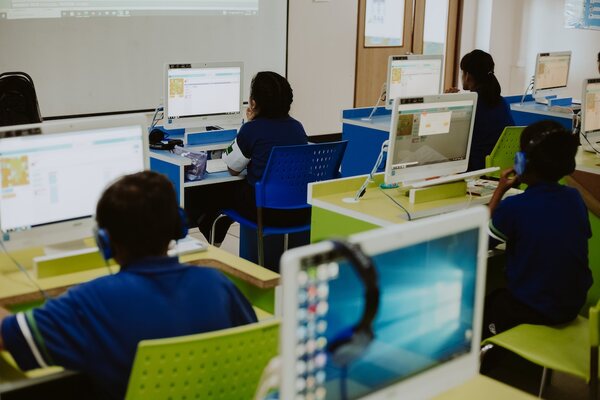Using Technology To Gamify Fitness for Your Kids
Some kids are naturally active. They play outside, do sports, and even exercise with you. Then, there are the kids that absolutely despise physical activity. They prefer hobbies that don’t involve exercise, like art, writing, and acting.
But whether your children fall into the first group, the second, or somewhere in between, it’s important to support them in having a healthy, active lifestyle.
Gamifying their fitness routine can encourage physical activity in your kids, whether they love to exercise or hate it. Here’s why.
Why Gamifying Fitness Works for Kids
Gamification is the practice of turning an activity or task into a game or something resembling one. When you add gamelike elements to a sometimes daunting task like exercise, it becomes much more fun and desirable. It’s also easier to complete, which keeps your kids motivated and uplifted.
You can show your children that physical activity doesn’t have to be boring or, worse, so physically and mentally taxing that they never want to do it again. Instead, they can make exercise an enjoyable activity that keeps them fit and challenged.
A Significant Drawback to Gamification
As beneficial as gamifying fitness can be for your kids, there’s a significant drawback to consider. Gamifying fitness can include fun games like obstacle courses, nature walks, and tag. But for this article, we’re talking about gamifying fitness with technology. And that, unfortunately, means more screen time.
Whether your kids are playing a fitness game on their Xbox, following along with a fun workout on their smartphones, or doing some interactive games on their smartwatches, they’re staring at a screen to do it.
Increased screen time for kids can result in a shorter attention span, irritability, neck/shoulder pain, and behavioral issues. It also leads to longer exposure to harmful blue light.
Blue light glasses and filters can help ease the negative effects on your kids’ eyes when they’re engaging with screens. However, it’s best to limit your kids’ screen time. Gamified fitness routines may mean more screens, but that doesn’t mean you can’t put a time limit on how long they participate.
Four Tips for Gamifying the Fitness Experience for Your Kids
Aside from paying attention to screen time, do the following to ensure the gamified fitness experience for your kids is the healthiest and most enjoyable it can be.
Talk Exercise and Fitness Goals With Your Children
It’s incredibly important to talk about exercise and fitness goals with your children. Part of the reason they aren’t excited about physical activities is they don’t have a positive outlook on fitness or any goals to strive for.
Sit down with your kids and discuss getting them to be more physically active. Talk about why fitness is important to their holistic health. See what they say about exercise and listen to why they are or aren’t excited about it.
You may find out they’re struggling with fitness because physical activity is difficult for them in their current state. Or, it just hasn’t been a fun thing for them to do. That’s when you can bring up gamifying fitness.
Once they’re on board with creating a more consistent fitness routine, set some goals. Have your kids write down what they want to achieve as they add more exercise to their lives.
It’s also important to find out your kids’ level of interest in gaming.
Find Out Your Kids’ Level of Interest in Gaming
Gamifying fitness will work a lot better for your kids if they have an actual interest in gaming.
Find out how into gaming your kids are by asking things like:
- Which consoles are they fond of?
- What kind of video and computer games do they play?
- Why do they play them?
Note their answers to these and other questions that give you an idea of their gaming interests. Really digging into your kids’ gaming interests will give you a blueprint for how to best personalize the gamified fitness experience for them.
Explore Wearables
We’ll get into games and consoles that are good for gamifying fitness for your kids in the next section. But don’t forget to tap into the power of wearables. Wearables are electronic devices that people wear comfortably on their bodies.
Some of the most common wearable devices are:
- Fitness trackers;
- Biosensors;
- Smart health watches;
- Blood pressure monitors;
- ECG monitors.
Wearables can positively impact anyone’s fitness journey, children included, as they make it easy to proactively monitor one’s health. You can also watch fitness videos and participate in games that encourage physical activity from these devices.
The Fitbit Ace 3, Garmin Vivofit Jr. 2, Apple Watch SE, and these other watches and trackers are some of the best on the market right now for kids. Many of the trackers and watches made specifically for kids already include gamified fitness features on them.
Do more research on the wearable tech options out there for kids. If you can take your kids to a physical store that sells them so they can try them out before making a purchase, even better.
Choose the Best Games and Consoles
To truly use technology to gamify fitness for kids, you must make good game and console choices. In other words, choose games and consoles that encourage physical activity.
Here are some console choices to get you started:
- Nintendo Switch;
- Xbox Kinect/Xbox One;
- Nintendo Wii Sports;
- Quell fitness gaming console;
- VR headset and accessories.
Depending on the gaming consoles you have, put these games on your list:
- Wii Fit Plus;
- BOXVR;
- Dance Party;
- Ring Fit Adventure;
- Pokemon Go;
- Zumba Fitness: World Party.
There are many more games and consoles to choose from. Explore them with your children and don’t be afraid to experiment.
Conclusion
Getting your kids to be more physically active can be tough at times. But with the help of gamification, you can spark their interest and keep them motivated to consistently pursue a more active lifestyle.
About the Author
 Katie Brenneman is a passionate writer specializing in education, mental health, family lifestyle and online safety. When she isn’t writing, you can find her with her nose buried in a book or hiking with her dog, Charlie. You can follow her on Twitter.
Katie Brenneman is a passionate writer specializing in education, mental health, family lifestyle and online safety. When she isn’t writing, you can find her with her nose buried in a book or hiking with her dog, Charlie. You can follow her on Twitter.











